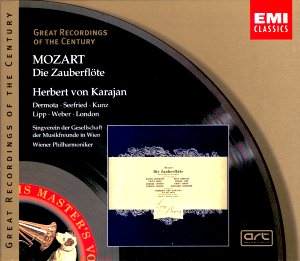This classic set of Mozart’s last opera makes a very
welcome return to the catalogue. Also, unlike some other issues in this
series, the refurbishment of the recording quality has done wonders
to the sound. Compared with a previous issue, the tape hiss is still
there, albeit reduced somewhat, but what is most noticeable is the clarification
of the sound quality, throughout the entire sound spectrum.
If you have heard the similar issue of Figaro, you
will know roughly what to expect – the improvement in the sound quality
is much the same.
What hasn’t changed however are the musical and production
values of this set which always have been of the highest order. This
recording was one of Walter Legge’s early collaborations with Karajan
and although it caused ructions in the recording industry, it has been
"the" version to have right from the time of its first appearance.
It has a dream cast, most of whom were house artists
at the Vienna Opera at the time. This means that they had the experience
of singing together as a team, albeit without in-depth experience of
Karajan’s guidance. This was because of the spat between Furtwängler
and the Vienna Opera with Karajan which kept the latter out of Vienna
for a number of years (almost permanently while Furtwängler was
alive).
Karajan performed Die Zauberflöte with
the majority of this cast however outside Vienna - in Berlin, and also
in Milan where Karajan was specifically asked for to conduct the Vienna
Company.
Walter Legge engaged Karajan to conduct, and assembled,
with Karajan’s guidance, the current cast, much to the fury of Furtwangler,
and presumably also of the Vienna Opera. The recording sessions went
extremely well, and this near perfect performance of Die Zauberflöte
was the result.
The playing of the Vienna Philharmonic is miraculous
for the day (technically they may do better today) but when this standard
of playing is married to the sheer musicality of the performance the
recording almost defies criticism. For fans of Mozart who insist on
hearing everything, this is the one area some may feel cheated. There
is no dialogue, which personally I find a great improvement for home
listening, but I am aware that some fans find that they need to hear
the dialogue.
Finally, and for some the most important factor in
choosing an opera recording – the singers. All of the main parts are
sung by singers at the peaks of their relative careers. They have been
caught superbly by the wonderful production by Walter Legge.
Irmgard Seefried and Anton Dermota as the two principals
sing with great sensitivity and would have been the highlight of the
set had not all the other singers been so good. For example Wilma Lipp
makes a stunning Queen of the Night, and Erich Kunz sings in most engaging
manner as Papageno.
I cannot recommend this issue highly enough. Truly
a Great Recording of the Century!
John Phillips

![]() Anton Dermota (Tamino),
Irmgard Seefreid (Pamino), Erich Kunz (Papageno), Wilma Lipp (Queen of
the Night), Ludwig Weber (Sarasto), George London (Speaker), Sena Jurinac,
Freidl Riegler & Else Schurhoff (The three ladies), Emmy Loose (Papagena),
Peter Klein (Monostatos).
Anton Dermota (Tamino),
Irmgard Seefreid (Pamino), Erich Kunz (Papageno), Wilma Lipp (Queen of
the Night), Ludwig Weber (Sarasto), George London (Speaker), Sena Jurinac,
Freidl Riegler & Else Schurhoff (The three ladies), Emmy Loose (Papagena),
Peter Klein (Monostatos).![]() EMI CMS5 67071-2 [129.07]
EMI CMS5 67071-2 [129.07]